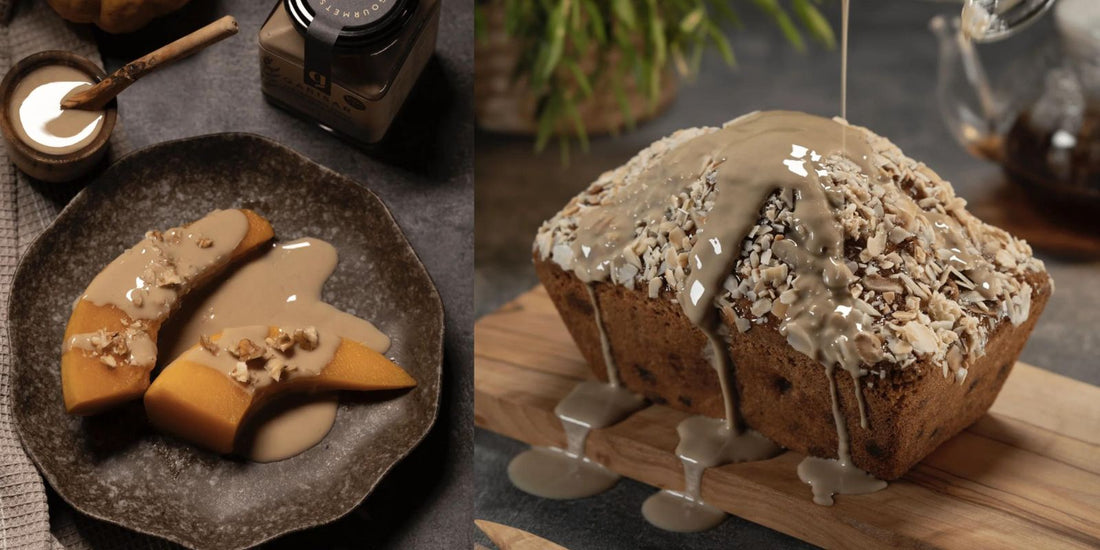
How Long Does Tahini Last in the Fridge: A Comprehensive Guide
If you prefer Middle Eastern food, you've probably heard of tahini, a creamy paste produced from mashed sesame seeds. Tahini is a wonderful and versatile ingredient that can be used in a variety of cuisines, from hummus to salad dressings. However, tahini, like most food products, has a shelf life, and knowing how long it lasts in the fridge ensures its freshness and safety.

Understanding Tahini
Before delving into the storage details, let's first understand what tahini is and why it needs proper preservation. Tahini is a condiment made from roasted or raw sesame seeds that are ground into a smooth paste. It's rich in healthy fats, vitamins, and minerals, making it a popular choice for health-conscious individuals.
Also Read: What is Halva: Exploring Tahini, Cocoa, and Pistachio Variations
Factors Influencing Tahini's Shelf Life
Several factors affect how long tahini can last in the fridge:
1. Type of Tahini
There are two main types of tahini: hulled (with the outer shell removed) and unhulled (with the shell intact). Unhulled tahini has a shorter shelf life due to its higher oil content.
2. Packaging
The packaging of tahini plays a crucial role in its longevity. Tahini stored in airtight containers tends to last longer than those exposed to air.
3. Temperature
Temperature is a significant factor in food preservation. Storing tahini in the refrigerator helps extend its shelf life compared to keeping it at room temperature.
4. Quality
High-quality tahini with no additives or preservatives tends to have a longer shelf life.
How Long Does Tahini Last in the Fridge?
Now that we've identified the factors, let's discuss the expected shelf life of tahini when stored in the refrigerator.
-
Unopened Tahini: Unopened tahini can last for up to one year when stored in the fridge. However, it's essential to check the expiration date on the packaging.
-
Opened Tahini: Once opened, tahini's shelf life decreases. It typically remains good for about 6-8 months in the refrigerator. Make sure to seal the container tightly after each use.
Signs of Spoiled Tahini
To ensure you're consuming safe tahini, be vigilant for these signs of spoilage:
-
Off Odor: If your tahini smells rancid or sour, it's time to discard it.
-
Strange Texture: Spoiled tahini may develop an unusual texture, such as separation or clumps.
-
Off Taste: If your tahini tastes bitter or different from its usual flavor, it's best not to consume it.
Proper Storage Tips
To maximize the shelf life of your tahini, follow these storage tips:
-
Seal the Container: Always seal the container tightly after each use to prevent air from entering.
-
Keep It Cool: Store your tahini in the refrigerator at a consistent temperature to maintain freshness.
-
Check for Contaminants: Ensure that no water or other contaminants enter the tahini container, as moisture can lead to spoilage.
-
Rotate Stock: If you have multiple containers of tahini, use the oldest one first to avoid wastage.
-
Consider Vacuum Sealing: If you want to extend the shelf life further, consider vacuum-sealing smaller portions of tahini.
About Garisar: Your Source for High-Quality Tahini
At Garisar, we take pride in offering high-quality tahini to our valued customers. Our tahini products are sourced from the finest sesame seeds and are carefully processed to retain their natural flavor and nutritional value.
We understand that the freshness and quality of tahini are paramount, and that's why we ensure that our products are packaged in airtight containers to preserve their taste and extend their shelf life.
When you choose Garisar for your tahini needs, you can trust that you're getting the best. We are committed to providing our customers with the finest tahini products to enhance their culinary experiences.
Conclusion
Tahini is a delicious and healthful condiment that, if preserved properly, may stay for a long period in the fridge. You may enjoy fresh and excellent tahini for a prolonged length of time by understanding the variables impacting its shelf life and following correct storage procedures.
Now, let's address some frequently asked questions:
FAQs
Can I freeze tahini for longer storage?
Yes, you can freeze tahini to extend its shelf life further. Divide it into smaller portions, place them in airtight containers, and freeze. Just be aware that tahini may change in texture after freezing, so stir it well before using.
What should I do if my tahini separates in the fridge?
If separation occurs, simply stir the tahini thoroughly until it regains its smooth consistency.
Is it safe to consume tahini past its expiration date?
While tahini can be safe to eat past its expiration date if stored properly, it's best to use it within the recommended time frame for optimal quality and flavor.
Can I store tahini in the pantry?
While it's possible to store tahini in the pantry, it's not recommended for long-term storage. Refrigeration is the best way to preserve its freshness.
Are there any creative ways to use leftover tahini?
Absolutely! You can use leftover tahini to make salad dressings, drizzle it over roasted vegetables, or add it to smoothies for a nutty flavor and creaminess. The possibilities are endless!
Remember to enjoy your tahini while it's at its best, and for quick access to high-quality tahini, visit Garisar.